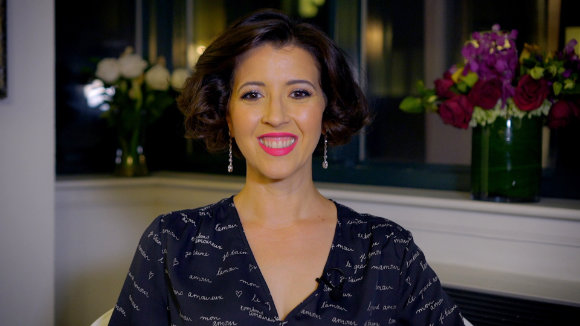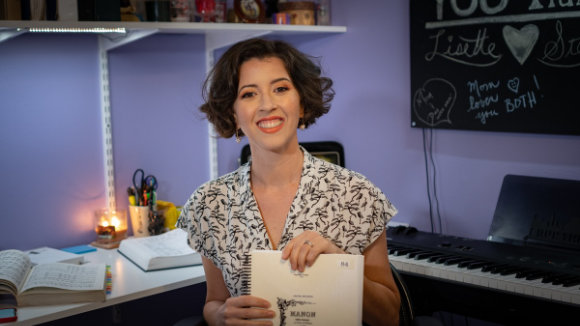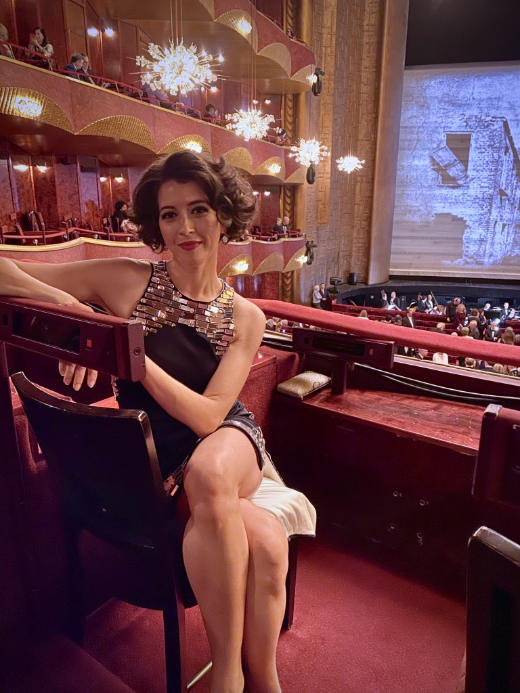Summer NewsletterFrench roles, recitals, concerts, and masterclasses for the fall!  Click here to view the video newsletter This season I am honored with so many incredible opportunities and am filled with gratitude. This will be an unforgettable fall season. I’m doing my first ever performances of the title role of Massenet’s MANON at the Metropolitan Opera! It’s also my biggest role at the Met in a long time, and as this year’s winner of the Beverly Sills Award, it comes with a special significance for me, as this was one of her signature roles. There will be an HD broadcast on October 26th and I’m so excited! But before the HD, I am happy to make my South American debut in a special solo concert in Rio de Janeiro, Brazil for Grandes Vozes on October 13th, and I’ll be giving a masterclass there as well. This year I have the honor of being the Richard Tucker Award winner, also, and right after our Manon HD, there is our gala at Carnegie Hall on October 27th. Then I head to New Orleans to give a recital on November 13th, accompanied by stunning pianist Michael Borowitz. From there, we head to Washington, D.C. where I’m thrilled to join Betsy Bishop at the Potomac Vocal Institute in a masterclass open to the public, on November 16th. To cap off the French roles of the season, I’ll be singing the role of Ophélie in Thomas’ HAMLET with the Washington Concert Opera on November 24th. |
|---|
Upcoming Performances MANONMetropolitan Opera Manon Lescaut  The October 26th performance will be broadcast LIVE IN HD in cinemas worldwide. Exhilarating soprano Lisette Oropesa stars as the irresistible title character, the tragic beauty who yearns for the finer things in life, in Laurent Pelly’s revealing production. Tenor Michael Fabiano is the besotted Chevalier des Grieux, whose desperate love for Manon proves their undoing. Maurizio Benini conducts Massenet’s sensual score. The October 26th performance will be broadcast LIVE IN HD in cinemas worldwide. Exhilarating soprano Lisette Oropesa stars as the irresistible title character, the tragic beauty who yearns for the finer things in life, in Laurent Pelly’s revealing production. Tenor Michael Fabiano is the besotted Chevalier des Grieux, whose desperate love for Manon proves their undoing. Maurizio Benini conducts Massenet’s sensual score.
October 02, 05, 19, 22, 26 Metropolitan Opera New York, NY |
|---|
 Concert & MasterclassGrandes Vozes Lisette will be making her South-American debut in Rio de Janeiro with a concert performance and a masterclass with Grandes Vozes. The masterclass will be webcast. October 13 Theatro Municipal do Rio de Janeiro Rio de Janeiro, RJ |
|---|
 Richard Tucker GalaRichard Tucker Music Foundation The Richard Tucker Music Foundation recognizes Lisette Oropesa as their winner of the Richard Tucker Award this year in a special gala at Carnegia Hall on October 27th. October 27 Carnegie Hall New York, NY |
|---|
 RecitalNew Orleans Friends of Music Lisette Oropesa and Michael Borowitz perform a recital in New Orleans at Tulane University. November 13 Dixon Hall New Orleans, LA |
|---|
 MasterclassPotomac Vocal Institute Lisette will be giving a masterclass with the Potomac Vocal Institute with the Divas and Donuts masterclass series. The event is free and open to the public! November 16 Potomac Vocal Institute Washington, DC |
|---|
 HamletWashington Concert Opera Ophélie Based on a French stage adaptation of the classic Shakespeare play by Alexandre Dumas and Paul Meurice, Ambroise Thomas’ Hamlet is a ravishingly beautiful piece, complete with Ophelia’s famous mad scene -- just one of many striking moments in this vivid drama. It is a tragic tale of love, deception, and the high power of art. November 24 Lisner Auditorium Washington, DC |
|---|
FeaturesLearning and memorizing a new role.Article  This video is focused on musical preparation and memorizing. Of course there is a lot more that goes into role preparation, such as historical research, dramatic and character work, reading the book or play the opera is based on, etc. That’s a subject for another video. So I hope you can gain some tools for your musical prep and share ideas in the comments below! This video is focused on musical preparation and memorizing. Of course there is a lot more that goes into role preparation, such as historical research, dramatic and character work, reading the book or play the opera is based on, etc. That’s a subject for another video. So I hope you can gain some tools for your musical prep and share ideas in the comments below!
|
|---|
Lisette is interviewed by the Metropolitan OperaInterview Like Manon, for instance. What do you think makes the story of this heroine so captivating? "It’s about a woman who gets punished for doing the exact same thing that the men in her society are doing without consequence—for her desire to have her cake and eat it too. That’s why it’s an intriguing story: she’s not a victim! In fact, when I was first studying her, I thought, you can just make her shallow, or you can play her as easy. But lots of the men in the opera are exactly the same way: Her cousin is like that. Her boyfriend, in a lot of ways. And his father, not exactly a model of morality. But Manon gets punished for it. So I feel like the issue with her is trying to make her loveable |
|---|
After overseas triumphs, soprano returns to Met OperaInterview by the Associated Press She also had her doubts about the character of the heroine, who abandons her first lover, the Chevalier des Grieux, to pursue riches and ultimately dies destitute. “When I first read through it my thought was, ‘Oh, what a jerk. Who cares if she dies,’” Oropesa said. But her view softened as she studied the part. “She just doesn’t love him as much as other things she wants a little more. She wants to have her cake and eat it, too, and there’s nothing wrong with that. You have to make her, not sympathetic, but real.” |
|---|
ReviewsLisette Oropesa tackles the role originally designed for Jenny Lind (whose bicentennial will undoubtedly be commemorated next year in Sweden). This single female character is the most caring of all. The Amalia of Oropesa has not only the heart on the hand, but also its breathing and palpitations, which become practically physical in a way that evokes the audible breath of a Violetta or Gilda. Oropesa knows how to make the most of vocal writing: the more his coloratura and his impeccable jumps between the registers rise to the stratospheric levels, the more his warm and melancholy tone becomes more beautiful and more secure. When she learns that Carlo is alive, she makes a sudden change of intention, touching the madness, which offers an irresistible moment. The delighted spectators unite to reward her, her colleagues and the whole orchestra (which comes on the set) with a standing ovation. — Andreas Wahlberg • Olyrix
|
|---|
Born to the romantic bell-cadet, the 36-year-old lyricist demonstrated her great class: her medium-sized, well-placed, luminous voice - obviously more suited to her more moving last two acts than to her crafty requirements - her huge Roman amphitheater, her aesthetic and the good taste of her song (trillions, ornamentations) constantly reminded the early Verdi's Bell-Candid debts, the stage presence was ethereal, emotional and emotional j with correct passion doses. Athens was lucky enough to enjoy - and rightly so! - a singer who has all the backgrounds (youth, beauty, voice, stage displacement) to shine worldwide in the role of tragic partner! — Eutychios D. Choriatakis • Athinorama
|
|---|
Lisette Oropesa was Violetta, a role she sang a few years ago and she interpreted the space of a night in Athens a few days before, just to put it in voice. What always amazes Oropesa and that delights is first of all his almost perfect Italian phrasing, his sense of color, the impeccable control of the voice and the holding of the breath. He has sometimes been reproached with a sort of superiority of technique over emotion; on the contrary, here we have the union of impeccable technique and the meaning given to each word, the weight of the expression (what a second act, what intensity in amami Alfredo!) and interiority, a strange word in a representation. in front of 15,000 people, where she is a small white spot on the immensity of the scene. Lisette Oropesa, of Cuban origins, has an obvious familiarity with a Latin phrasing, and a real sensitivity, besides a technique of iron acquired in the American formation. It is from the outset a Violetta with which we will have to count, because I think it will multiply. His Addio del passato is exemplary, and even his reading of the letter, so clear. And moreover it has the notes it takes, in the agility (his first act) as in the more lyrical moments of the second (called alla giovine upsetting and probably also tenfold by the emotion distilled by his partner Domingo) . — Guy Cherqui • Le blog du Wanderer
|
|---|
Lisette Oropesa’s performance in Massenet’s opera at the Met is alone worth the price of admission. Ms. Oropesa slips into the title role as if it were custom couture. In her first aria, “Je suis encore tout étourdie,” sung with enunciation so clear it could be transcribed, she has an innocent lightness that gives way to intoxicating joy as it becomes apparent that Manon is already too grand for her humble packaging at the start: slight frame; childish hat and ponytail; plain outfit in muted blues. As the opera continues — with Massenet’s effervescent and eclectic score, eager to please and utterly pleasing under the baton of Maurizio Benini — Ms. Oropesa’s musicality becomes even more layered. It can be easy to play Manon as a ruthless femme fatale, for example, as she becomes the toast of Paris, and Ms. Oropesa was suddenly big-voiced, glamorously tossing off high notes with insouciant sprezzatura. But hear also how she shrinks her sound to a stark mournfulness in “Adieu, notre petite table,” pained yet chilly as she prepares to leave des Grieux for another man’s luxury. — Joshua Barone • New York Times
|
|---|
Reflections I’ve always found it interesting that when the fall season begins, the opera season also begins. I never think of autumn as a beginning, but it’s become one, professionally, for me. That said, there isn’t really a sense of ending! Our whole business is that way; when most people’s days are ending, ours are beginning, as we are the entertainment for the evening, a kind of escape for so many, into our beautiful world of all-encompassing music. We bring all of our organic selves every moment, and when the performance is done, we reflect and hope that we have managed to bring joy, passion, excitement, or any emotion at all, to someone in the audience. It makes me so happy when people are moved by our work, as it is not easy to break down into building blocks, but is more like a lump of clay. Though many see opera singers as demigods, I find it ironic that it’s the raw humanity of our work that somehow translates into the divine. I feel so blessed with this gift and love every moment of this very challenging path, because I am reminded that despite my struggles and hardships, somebody out there is being moved. I’ve always found it interesting that when the fall season begins, the opera season also begins. I never think of autumn as a beginning, but it’s become one, professionally, for me. That said, there isn’t really a sense of ending! Our whole business is that way; when most people’s days are ending, ours are beginning, as we are the entertainment for the evening, a kind of escape for so many, into our beautiful world of all-encompassing music. We bring all of our organic selves every moment, and when the performance is done, we reflect and hope that we have managed to bring joy, passion, excitement, or any emotion at all, to someone in the audience. It makes me so happy when people are moved by our work, as it is not easy to break down into building blocks, but is more like a lump of clay. Though many see opera singers as demigods, I find it ironic that it’s the raw humanity of our work that somehow translates into the divine. I feel so blessed with this gift and love every moment of this very challenging path, because I am reminded that despite my struggles and hardships, somebody out there is being moved.
|
|---|
|
|---|
|
|---|
|
|